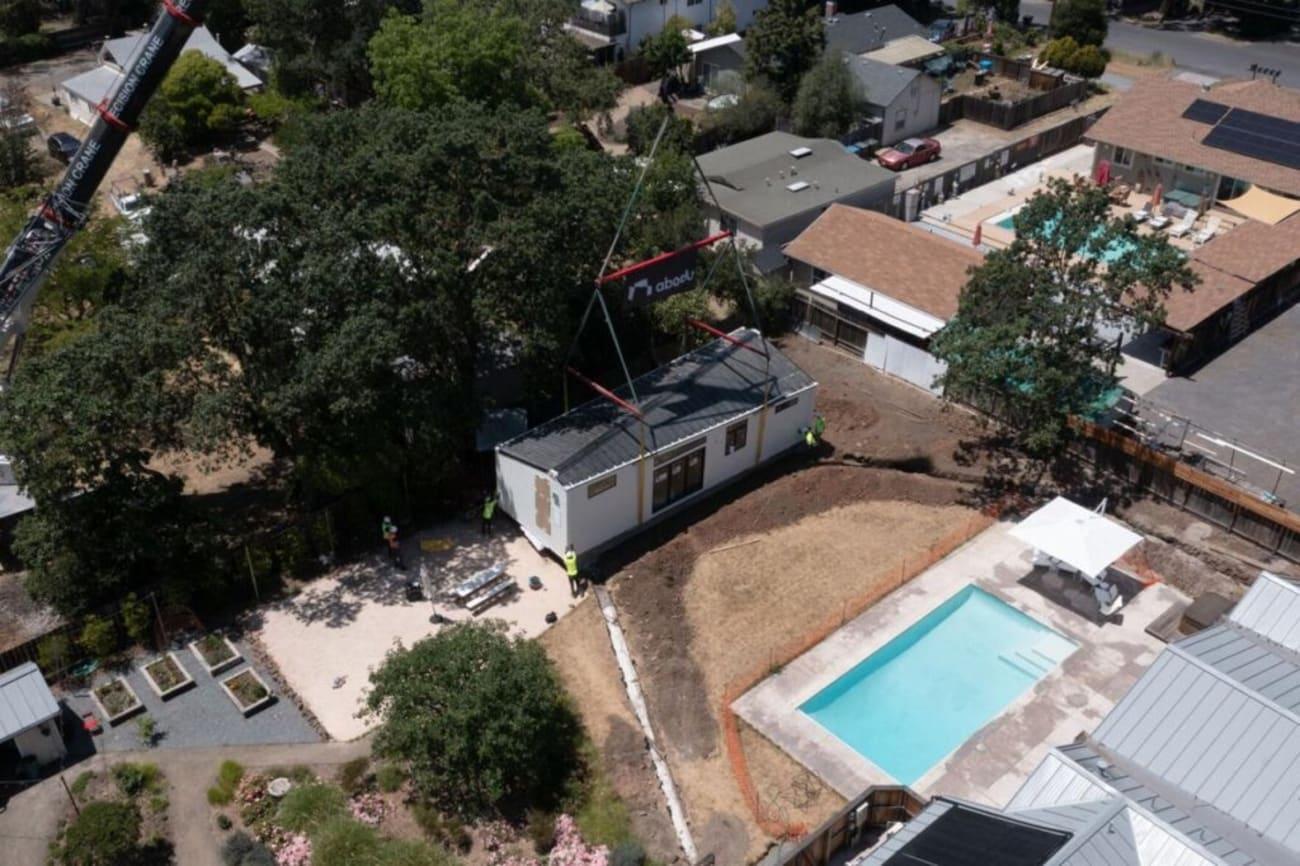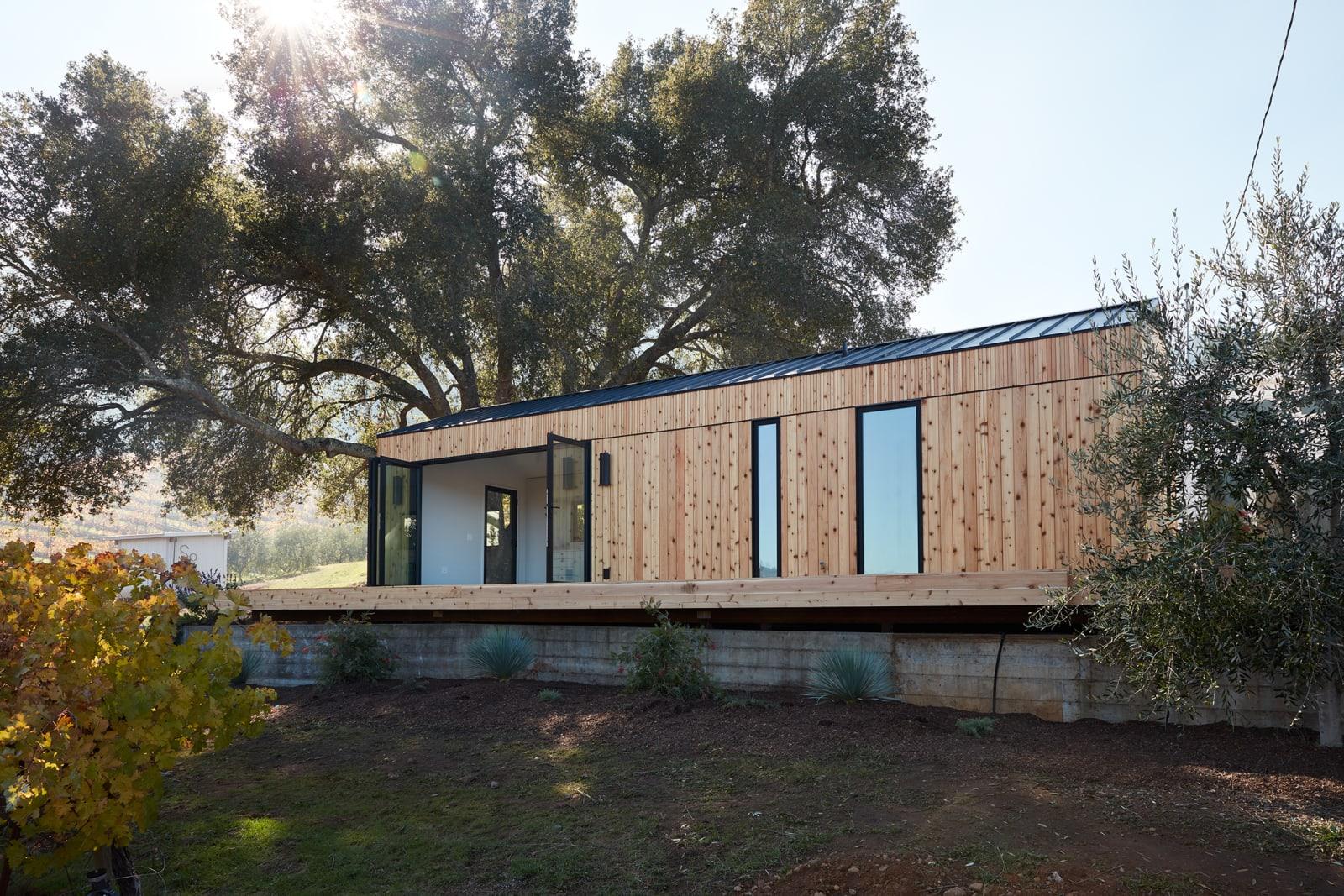Prefab Accessory Dwelling Units are coming to the North Bay
June 12, 2022 | Napa Valley Register | By Edward Booth

An aerial shot of an Abodu prefab ADU installation in Sonoma. Courtesy, Abodu
Abodu, a company focused on building prefabricated Accessory Dwelling Units, installed its first North Bay unit in unincorporated Sonoma County roughly two weeks ago. The company says more units will be coming to both Sonoma and Napa counties in the coming months.
ADUs are small, self-contained living units that can be attached or detached to single family homes, within the single family lot. A statewide boom in ADU approvals started up roughly five years ago, when California legislators required local municipalities to relax their regulations on ADUs approvals. Further legislation, particularly in 2020, has made building such units even easier.
Legislators have framed opening up the approval process for ADUs as one part of an effort to take on California’s housing crisis. Though getting ADU plans approved by local governments has become swifter and easier, that’s only one part of the process. The time and financial burden of building such units falls on homeowners who typically have no experience with construction, said John Geary, CEO of Abodu.
That’s a problem because even if a homeowner has sufficient money and interest to build such a structure in their backyard — perhaps because doing so could give them needed rental income, because they’d like to move a family member in there or a variety of other reasons — they might see the time commitment and uncertainty of trying to learn how to navigate the process as too much of a burden.
Abodu designed its business around taking stress out of the process by handling most of it themselves, Geary said. Renée Schomp, director of the Napa Sonoma ADU Center nonprofit, said that similar options are offered by a several other prefab ADU companies.
“Construction is tough. It’s dirty. It’s expensive. It’s confusing. And when the average homeowner is building an ADU, they’re essentially building a home in their backyard,” Geary said. “What we saw is most homeowners aren’t equipped to do that well. It’s a scary endeavor; there’s a lot of opacity in the industry. And so our goal was, how do we make this as simple as buying a car or a product; how do we make it easy as possible for folks?”
Cindy Loughridge and Seth Restaino, owners of the ADU in Sonoma, said that when they bought their home roughly a year ago, there was already an old, run down ADU on the property. The homeowner at the time was working with another company to replace that with a new ADU, which Loughridge said was a selling point for the house.
“The state of the old ADU was almost a deal-breaker,” Restaino recalled. “It was an eyesore, and it had to either come down or be reworked.”
But the company that would’ve built the ADU ended up busy for at least a year, perhaps because of supply chain delays, Loughridge said. Loughridge then discovered Abodu as a replacement option that would get the new ADU installed there relatively quickly. Restaino said the unit — the most expensive model out of three possible Abodu choices, a two-bedroom unit with some upgrades — cost roughly $425,000 in total.
And though organizations like Abodu also work with local governments to have their ADU options essentially be pre-approved to cut down on delivery time and hassle, the ADU Center’s program attempts to solve another potential flaw of prefab ADUs: the relative lack of options most prefab companies offer on their own. Those looking for ADUs can see options from a variety of companies: Abodu, Villa, Connect Homes, Inspired ADUs, Homes for Sonoma and more.
“What I have seen time and time again in the housing space is there’s no single silver bullet solution,” Schomp said. “You cannot say prefab is the answer; it’s one of the tools in the toolkit. And we’re going to be the most successful to meet our housing crisis if we approach with a diversity of housing options.”
Schomp added that she was initially skeptical of prefab ADU companies given that many of them started up, backed by venture capital, after the state’s 2020 housing laws that made local permitting processes for ADUs more uniform came into effect. Those processes still aren’t entirely uniform, she said, which means that in order for the companies to be successful, they need teams of employees that work closely with every jurisdiction they’re building ADUs in.
Schomp said she didn’t anticipate that she’d feel the prefab companies have proven themselves this quickly, but she now feels confident referring people to them. And she believes prefab ADUs are a vital part of solving California’s current housing puzzle.
“I’m pleasantly surprised by how successful these companies have been so far, and I’m seeing homeowners significantly shifting from wanting to do traditional construction to wanting to do prefab,” Schomp said.
